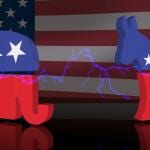
The economy took a big hit with the coronavirus shutdown, as thousands of small businesses closed and millions of workers lost their jobs. Though the stock market and some tech companies did well, many observers are worried about whether or not the economy can recover in the near future.
But others are forecasting an economic boom. Not just because of pent-up economic demand once the pandemic is over, but because of what they see as a systemic economic development that could bring about a new Roaring Twenties.
Though the American economy has performed pretty well so far in the 21st century, for the last two decades, productivity has been lagging. To be sure, the computer revolution of the late 20th century had a huge economic impact in multiplying the ability of workers to increase the amount of goods and services they can produce. But since then, though technology has forged ahead with new advances, gains in productivity have been relatively stagnant. As a result, wages have also been relatively stagnant.
But all this time, potentially game-changing technology was in the process of development, and there have recently been breakthroughs in areas such as Artificial Intelligence, machine language, solar power, and remote working, as well as entire new industries such as electric cars and private spacecraft. These have the potential to bring about not only dramatic economic activity but also significant productivity growth, which is the engine of sustained economic gains.
So says Bryan Walsh in The coming tech-driven productivity leap, which links to an array of economists and other experts who are making this argument.
But we should consider some factors that might put a brake on such economic exuberance. Productivity gains can mean greater unemployment, at least in the short term, since fewer workers are needed to produce the same output. Also, we don’t know what the effect will be of the
federal debt soaring to some $24 trillion, which surpasses our entire gross domestic product (136%). Also, as both Democrats and Republicans seem to have turned against–for good reason–big corporations, including the tech industry, we might wonder what the new Democratic administration will mean for businesses. New regulations and the reimposition of old ones can put a damper on things, as will higher taxes and restrictions on investments. And, overall, I see a return to big government and the notion that the government can and should manipulate the economy towards a higher good. That wouldn’t bode well for the economy.
The 1920s were presided over by the minimal governance of Calvin Coolidge; the 2020s will be presided over by the progressive governance of Joe Biden. Besides, the prosperity of the Roaring Twenties was in large part a function of cultural energy and vitality, as opposed to our current cultural exhaustion and malaise. And the Roaring Twenties, despite the accomplishments of that time, would lay the groundwork for the Great Depression of the 1930s.
So we should probably hold off on doing the Charleston.













